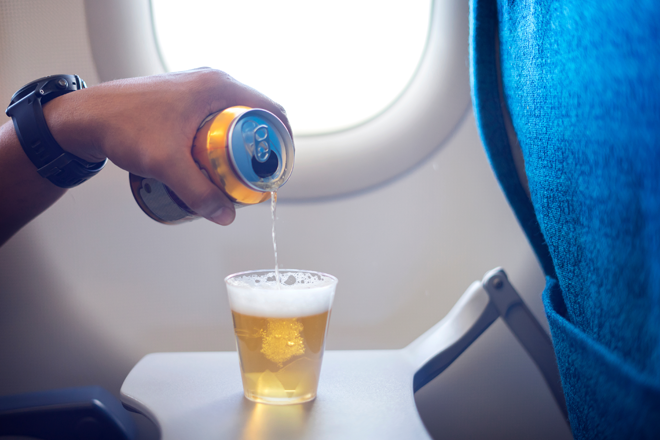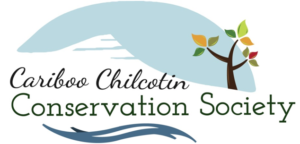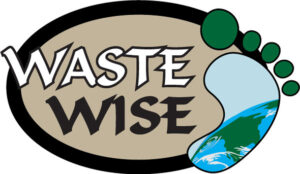By Mary Forbes, Waste Educator, Cariboo Chilcotin Conservation Society
I have been teaching Waste Wise for 10 years now and have seen many positive changes in recycling policy and increasing public participation but there is still one place I just experienced that seems to be operating in a vacuum, (or pressurized cabin!). I recently flew to Regina for a Zero Waste Conference (yes, there is some irony). On the smaller plane I asked our stewardess if the clear plastic cups get recycled. She responded, “not on the small flights, but the big mainline flights do recycle everything.” So once on the big plane, I asked again if the plastic cups get recycled, and according to the flight attendant the answer was “no,” but apparently “everything else does”. More probing uncovered that “everything” meant all the drink containers, but nothing else (napkins, coffee bags, etc.). I later checked the airline’s website, which states that onboard recycling occurs at eight out of nine major Canadian airports for domestic flights but doesn’t list exactly what gets recycled.

I remember an image Chris Jordan, an art trash photographer, created in 2010 of how many plastic cups airlines go through in the US each day—one million cups every six hours. That was nearly 10 years ago. I wonder what the number is now? How much oil does it take to make that one million (or more) plastic cups we drink out of for just a few minutes? How many cups are used worldwide on flights every six hours? The captain mentioned offhandedly before we taxied for take-off that we needed to take on seven tons of fuel, making me wonder idly how many flights could be fuelled by the oil used to make all those plastic cups.
Watching the drinks cart travel down the aisle in a plane with 27 rows and four seats in each row, I am pretty sure I am the only one who used a reusable cup. That’s 107 cups used. They then collect the cups in a trash bag, most with a nested paper napkin inside (making both cup and napkin unrecyclable). I expect there will be another drink offer before landing in Regina, and probably another 107 cups be thrown away.
I can see into business class, where breakfast comes on a glass plate with cloth napkins, so am assuming they are reused. Is there no workable way to provide reusable tableware to all the passengers? On a ‘big picture’ scale, this would save money on landfills world-wide, and on the up-front purchase of single use cups to the airlines.
I recognize that issues around recycling programs are complicated and it takes time and effort to come up with solutions. The airline explains some of these issues on its site. Last week I had a question from a teacher: is a WD40 container recyclable? So, I called the BC recycling hotline and the agent said not if it is empty (as with all industrial lubricants); if it still has product in it, it can go into the hazardous waste collection. Then I asked the BC Used Oil Management Association (BUCOMA) if they had a solution. They said no. I tried the Product Care Association, a non-profit that helps with household waste disposal. Again no, but they suggested (as with bear spray canisters) contacting an independent hazardous waste company and pay to have it recycled. Next, I called WD40’s head office in the States; the cans can be recycled in the States, but not here in BC. I am a motivated waste educator with a decade of experience buttrying to find out how to recycle a used can of WD40 takes me an hour of research and then hits a disappointing dead end. No wonder individuals, municipalities, and businesses can take some time to find workable solutions to their waste issues.
As all these thoughts are circulating, my plane starts the approach to Regina. The Zero Waste Conference will be an opportunity to share ideas and solutions to these problems as society inches forward along the path to reducing our garbage and plastics production. I thought of changes my friends and I are making to help reduce our personal impacts on the planet; for instance, one family has chosen to be vegetarian unless they catch or shoot their own meat. The delicious venison lasagne I ate at their place has motivated me to add only eating humane protein to my personal goals, on top of some of the changes I’ve already made (such as no new clothes, no coffee, no alcohol, no soft drinks, and no store-bought bread). The winds of change are gently blowing at higher levels too; for instance, the UK is actually currently considering banning all single use plastics. I land, hopeful that increasing pressure from populations to address these issues is starting to have results, and that airlines are aware of this pressure and will, with time, find solutions to their own waste issues.
Mary Forbes is an archaeologist turned waste educator for the Cariboo Chilcotin Conservation Society and naturalist for Scout Island Nature Centre.



